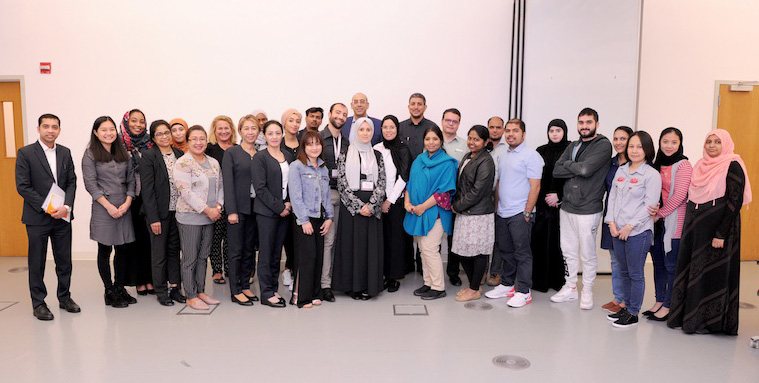The latest symposium at Weill Cornell Medicine-Qatar (WCM-Q) explored the impact on health of the complex interactions between the nervous system, the gut and the microbiota – the microorganisms living in the gut.
The activity, directed by Dr Ghizlane Bendriss, a visiting lecturer on biology, focused in particular on the vagus nerve and its role as a mediator of microbiota-gut-brain communication. As the longest cranial nerves in the human body, the two vagus nerves run from the brainstem, through the neck and into the abdomen, connecting the brain with many disparate organs, muscles and structures, including the colon.
The Microbiota, the Gut and the Brain

A growing body of research suggests that the complex interactions between the microbiota, the gut and the brain are important determinants of human health, and that an imbalance in the gut microbiota could be a causal factor in a variety of conditions, including ulcerative colitis, irritable bowel syndrome, Crohn’s disease, diabetes, obesity, Parkinson’s disease and many other neurodegenerative diseases and neuropsychiatric disorders. As the conduit for many of these interactions, the vagus nerve is a logical target for researchers.
Dr Bendriss said that scientists are witnessing increasing evidence on the emergent role of the gut microbiota as a key player in inflammatory diseases, neurodegenerative diseases and neuropsychiatric disorders. Nevertheless, he said that it is still a challenge to raise awareness among healthcare professionals on the importance of the gut microbiota, and therefore lifestyle and nutrition, without unraveling the mechanisms involved.
This symposium aims to provide an update on one of the key routes that allows the bidirectional communication between the gut and the brain: the vagus nerve. This is a very exciting area of research that holds a lot of potential for enhanced understanding of chronic inflammatory diseases and other conditions that we hope will lead to improved or novel treatments and preventative measures.’
The workshop also featured a presentation by Dr Riham Shadid, a diabetes educator and health coach, who defined the gut microbiota and the main mechanisms involved in the gut-brain axis and explained the role of antibiotics, probiotics and lifestyle on microbiota diversity and inflammatory processes.
Another researcher, Dr Mehdi Djelloul, described the anatomical connection between the gut and the brain and presented concrete studies that illustrate the role of the vagus nerve under inflammatory conditions and how the microbiota is involved in this process. He also gave clinical examples on the benefit on modulating the gut-brain-axis.
A Q&A session followed after the lecture, allowing participants to discuss freely on the topic. The lecture was titled, ‘The vagus nerve as a key mediator of the microbiota-gut-brain axis: from research to clinical implications’.
The event was accredited locally by the Qatar Council for Healthcare Practitioners-Accreditation Department (QCHP-AD) and by the Accreditation Council for Continuing Medical Education (ACCME). Visit the qatar-weill.cornell.edu for updates and more information about WCM-Q lectures and fora.





